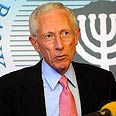
Bank of Israel leaves key rate at 2.75%
Fearing impact of lower interest rates on shekel's exchange rate, central bank decides to leave rates unchanged in January. Decision also affected by desire to keep enough tools to deal with possible future deterioration in global, local economy
The decision contradicts early estimates of capital market analysts, who expected the bank to lower its key rate for the second month in a row on the backdrop of the European debt crisis and concerns of a negative effect it may have on the Israeli economy.
Lowering interest rates would have reduced manufacturers' costs, while encouraging consumption, thereby boosting economic activity.
The main reason for the decision to leave interest rates unchanged was the Bank of Israel's fear that reducing the key rate would impact the shekel's exchange rate. A lower rate on the shekel would make the local currency less attractive in investors' eyes and lead to its depreciation against the world's important currencies.
In the past five months, the shekel has already depreciated against the currency basket ("the effective exchange rate") by close to 5%.
An additional interest rate cut, following two previous cuts in the past three months, could have led to a renewed drop in the shekel's exchange rate, which may have pushed import prices and the inflation rate up.
Figures released by the Central Bureau of Statistics two weeks ago revealed that the actual inflation rate for the past 12 month (the November 2011 consumer price index compared to the November 2010 index) now totals 2.6% and is within the annual inflation target range set by the government (1-3%).
Another reason for the decision to leave the interest rates unchanged is the Monetary Committee's desire to leave enough tools in the hands of the Bank of Israel to deal with a possible future deterioration in the global and local economy.
This was the third time since the Bank of Israel's establishment 57 years ago that the interest rate decision was made by the Monetary Committee rather than by the bank's governor on his own.
The Committee, which took over all of the governor's monetary decisions under the new Bank of Israel Law, has six members, three of whom are representatives of the public. The Committee makes its decisions through a vote. In case of a tie, the governor, who heads the Committee, has the right to vote twice.










